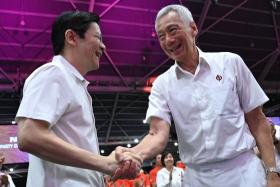Fake news law used on opposition politician's post on MOE spending
MOE says Lim Tean's posts imply Govt spends more on foreign students than local ones; Lim has put up correction note and is considering legal options
Opposition politician and lawyer Lim Tean was issued a correction order under the Protection from Online Falsehoods and Manipulation Act (Pofma) yesterday, the fourth such order to be issued in three weeks.
Mr Lim, the founder of political party People's Voice, was asked by the Ministry of Education (MOE) to correct two Facebook posts on Dec 12 that the ministry says had implied that the Government was spending more on foreign students than Singapore students.
The Pofma office was asked by Education Minister Ong Ye Kung to issue the correction directions to Mr Lim.
According to the release on government website Factually, the two statements made by Mr Lim - "the total pot available to Singaporean students $167 million compared to the $238 million that is spent on foreign students" and "PAP spends $167 million on Grants and Bursaries for Singaporeans, but $238 million on foreign students??" - imply that MOE spends less on Singaporean students than on foreign students, which the Ministry debunked in the release.
The ministry said: "MOE's annual budget is $13 billion, almost all of which is spent on Singapore citizens.
"The $167 million cited by Mr Lim refers only to bursaries for Singaporean tertiary students, and grossly understates MOE's total spending on Singaporean citizens for education.
"The figures of $167 million and $238 million are therefore not comparable."
MOE also said the $238 million Mr Lim said was spent on foreign students was not accurate, as a large part of the sum was used for purposes like the maintenance of infrastructure, facilities and laboratories.
"These fixed and non-variable costs we have to incur anyway, whether or not we admit a small proportion of foreign students in the system," the ministry said, adding that foreign students make up about 5 per cent of the students here.
Mr Lim, who put up the correction note at about 10pm, responded in a Facebook post: "Anyone who read my post and the series of posts I made on this subject last week would have been under no mistaken impression that I was discussing the amount of money spent on grants and scholarships and not the overall spending on all Singaporean students."
Saying he is considering legal options, he added: "It is clear to me that Pofma is being used by this Government ahead of the upcoming GE (general election) to silence its opponents and chill public discussion of unpopular government policies."
REACTIVE
Experts pointed out that while it is possible to argue that Pofma might chill political discourse, the law itself is merely reactive and only kicks in to deal with inaccurate information, not opinion.
Political watcher and Singapore Management University Associate Professor Eugene Tan told The New Paper that the Pofma law targets not the author but the statements that contain falsehoods or misleading information.
The law also does not apply to opinions or assertions, even if they are based on misleading or false information, he added.
He stressed that Pofma does not and cannot compel people to believe and accept what they do not choose to. However, it ensures the public has the necessary and accurate information in forming their views.
Experts also said with the upcoming general election, there will likely be an increase in the law being applied because there will be more politicians and stakeholders speaking up in the lead up to elections.
Institute of Policy Studies deputy director Gillian Koh said: "In this run-up to a general election, in this age of social media, we must, as a voting public, welcome anything that ensures the veracity of key information before it really holds sway over public opinion with serious consequences.
"As we have seen thus far, the correction order allows for the debate to continue, after the statements are set right with what are the facts."
An MOE spokesman told TNP last night that the false statements undermine public confidence in the Government.
"They also exploit local-foreign sensitivities to incite ill-will between different groups of people. If not corrected, they can become entrenched and perpetuated, as can be seen in other countries."
Get The New Paper on your phone with the free TNP app. Download from the Apple App Store or Google Play Store now




